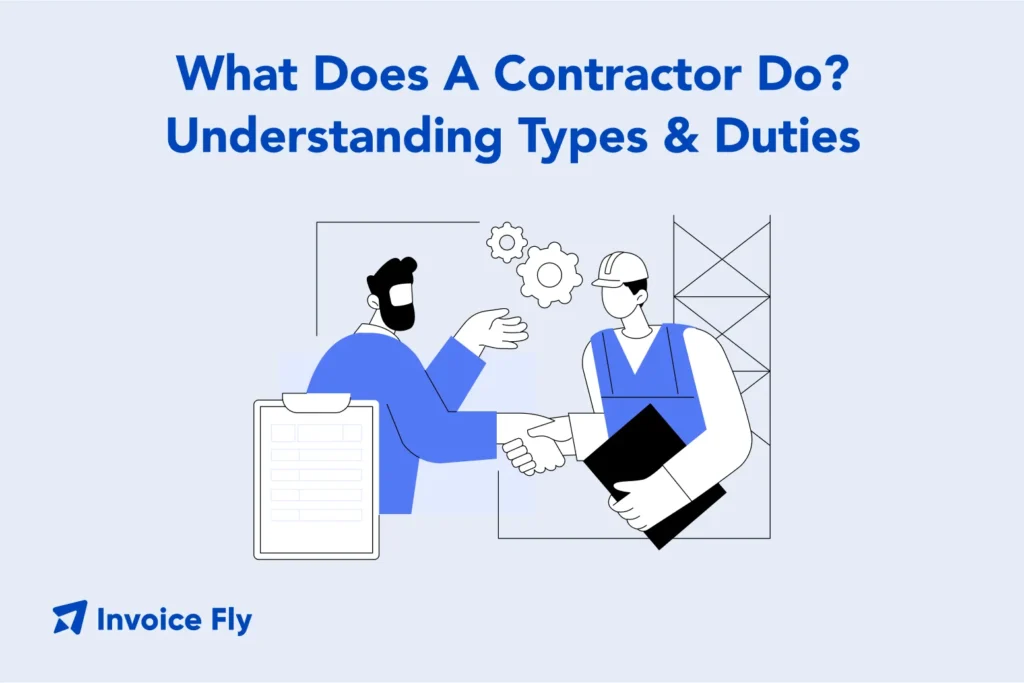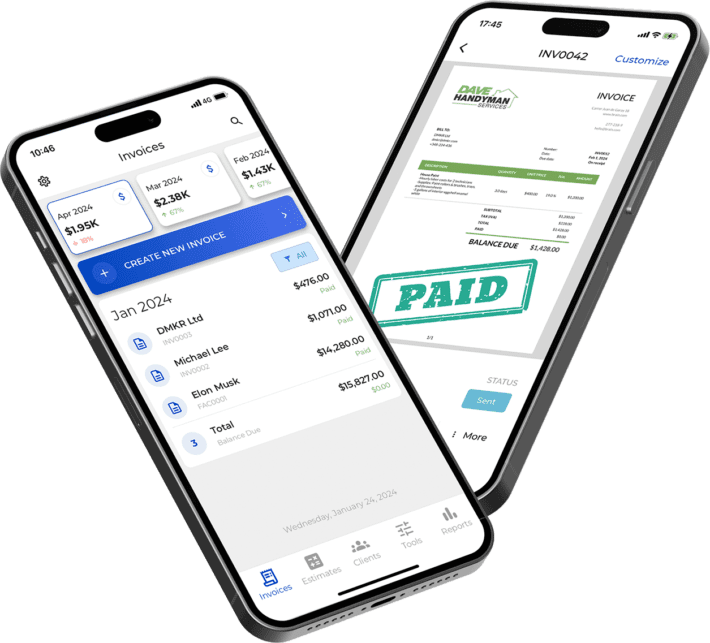What Does a Contractor Do? Understanding Types & Duties

Table of Contents
If you’ve ever watched a new home rise from the ground, a highway expansion take shape, or a commercial remodel come together, you’ve seen a contractor’s work in action. But what does a contractor do exactly? In simple terms, a contractor is the professional who plans, coordinates, and delivers a project — translating blueprints into finished results.
Contractors can be independent business owners or licensed professionals working under a company. They manage budgets, subcontractors, schedules, materials, safety, and permits. Everything that keeps a job site running smoothly.
This guide will cover:
- What contractors actually do day to day
- The difference between contractors and subcontractors
- The main types of contractors and what each one does
- How contractors are licensed and paid
- Common challenges and what to do when work goes wrong
Learn more about launching your own contracting career in our How to Start a Construction Company guide.
What Is a Contractor?

A contractor, by definition, is a person or company hired to perform work under a contract. In construction and service industries, they take responsibility for delivering a specific project or service within agreed timelines and costs.
They might oversee an entire commercial build (as a general contractor) or specialise in areas like electrical, mechanical, or concrete work.
Independent vs Employed Contractors
An independent contractor is self-employed (often registered as an LLC or sole proprietorship) and works for multiple clients. They manage their own insurance, taxes, and client contracts, often filing as a 1099 contractor.
An employed contractor, on the other hand, might be part of a larger general contracting firm and receive regular wages or benefits.
Learn the differences in our guide on LLC vs Sole Proprietorship for Contractors.
Contractors vs Subcontractors
A contractor manages the project; a subcontractor performs a specialised portion of it.
For example, a general contractor might hire an electrical subcontractor to install wiring and a roofing subcontractor to complete the roof.
Knowing this difference between contractor and subcontractor is key for anyone entering the industry, especially if you’re bidding on multi-phase jobs.
Get Started with Invoice Fly’s Software
Invoice Fly is a smart, fast, and easy-to-use invoicing software designed for freelancers, contractors, and small business owners. Create and send invoices, track payments, and manage your business — all in one place.

What Does a Contractor Do Day to Day?
Contractors oversee the entire life cycle of a project, from initial bid to final inspection. Their duties blend fieldwork and administration.
Core Responsibilities
- Project planning & management: setting budgets, timelines, and scopes.
- Hiring subcontractors: vetting and coordinating electricians, plumbers, and labourers.
- Purchasing & logistics: sourcing materials and equipment.
- Permitting & inspections: ensuring compliance with building codes.
- Client communication: providing progress reports, resolving issues, and securing approvals.
- Safety oversight: enforcing OSHA standards and maintaining site safety.
A contractor’s job site day often starts with a coordination meeting, continues with problem-solving on-site, and ends with paperwork — estimates, purchase orders, and invoices.
Essential Skills
Successful contractors balance trade knowledge with leadership. They need:
- Organisation and budgeting (project management software is a must)
- Technical know-how across building codes and materials
- Communication for negotiating with clients and suppliers
- Adaptability when projects face delays or change orders
Tools and Technology
Modern general contracting relies heavily on tech. Cloud-based tools for estimating, time tracking, and billing simplify admin work.
Pro Tip: Manage project bids, estimates, and invoices effortlessly with Invoice Fly’s Invoicing Software — built for contractors and independent tradespeople.
Types of Contractors and What They Do

The construction industry includes many contractor categories, each with specific duties, licenses, and expertise.
General Contractor
So, what does a general contractor do? They oversee every phase of a construction project — budgeting, scheduling, subcontractor coordination, and inspections. They secure permits and ensure compliance with all codes.
Example: What does a general contractor do in Florida?
Florida requires state licensing through the Department of Business & Professional Regulation (DBPR). GCs there handle everything from hurricane-resistant design to energy-efficient building materials, ensuring compliance with the Florida Building Code.
Building and Construction Contractor
A construction contractor or building contractor handles structural work such as framing, foundations, and drywall. They transform architectural plans into physical structures like homes, offices, and industrial buildings.
Mechanical Contractor
What does a mechanical contractor do?
They install and maintain mechanical systems like heating, ventilation, air conditioning (HVAC), refrigeration, and piping. Mechanical contractors often hold specialised licenses and work closely with engineers to ensure energy efficiency and safety.
Related article:Technician HVAC: What Do They Do & How To Become One.
Electrical and Plumbing Contractors
These licensed specialists manage building systems critical for daily operation. They plan wiring layouts, water supply lines, and drainage systems, coordinating with general contractors and inspectors.
See our guides on Electrical Technician and How to Start a Plumbing Business.
Concrete and Masonry Contractors
What does a concrete contractor do?
In short, they pour, finish, and repair concrete foundations, sidewalks, and driveways.
A masonry contractor builds structures using brick, stone, or block — balancing structural integrity with aesthetic appeal.
Roofing Contractor
A roofing contractor installs, repairs, and maintains roof systems. They evaluate materials, ensure waterproofing, and manage safety for work at height. Explore more in our Roofing Services guide.
Landscape Contractor
A landscape contractor designs and maintains outdoor environments: grading, planting, irrigation, and hardscaping. They blend construction and design, often collaborating with architects.
Government and Defense Contractors
What does a government contractor do?
They work on publicly funded projects such as roads, schools, and utilities, following strict procurement and reporting rules.
What does a defense contractor do or what does a military contractor do?
They provide goods or services to the Department of Defense, from base construction to logistics support. A private military contractor might offer security or infrastructure services in conflict zones under government oversight.
Each requires compliance with federal acquisition regulations and security clearances.
How Contractors Get Licensed and Paid

Obtaining a Contractor License
Most U.S. states require licensing to ensure professionalism and safety. Applicants typically need:
- Documented trade experience
- Proof of insurance and bonding
- Passing a state exam on laws and codes
Continuing education keeps licenses active, especially for mechanical and electrical trades.
Learn more in our General Contracting overview.
Common Payment Structures
Contractors can be compensated through several methods:
- Fixed-price contracts — one total price for the entire project.
- Cost-plus contracts — reimbursement of costs plus a profit margin.
- Hourly or day rates — common for maintenance or consultation.
- Milestone payments — progress-based instalments tied to deliverables.
They submit estimates before starting and invoices after milestones.
Use tools like Free Estimate Templates and the Profit Margin Calculator to price work accurately.
Contractors also rely on project management systems and invoicing software to track payments, reduce paperwork, and forecast revenue.
Common Challenges Contractors Face

Financial and Administrative Issues
Late payments, material cost spikes, and inaccurate bids can derail cash flow. Tools like Invoice Fly’s Invoicing Software help contractors automate billing and track expenses.
Workforce and Scheduling
Finding skilled subcontractors and coordinating multiple crews across job sites is difficult, particularly during labour shortages.
Safety and Compliance
Contractors are responsible for ensuring every job site meets OSHA standards and that all employees follow PPE protocols.
Client Disputes and Quality Concerns
Miscommunication can lead to disagreements over deadlines or workmanship. If problems arise, knowing what to do when a contractor does poor work is essential for both parties: document issues, reference the contract terms, and contact state licensing boards if needed.
For more business guidance, see our Getting Paid Guide For Freelancers & Contractors and Invoicing Mistakes.
Ready To Become a Contractor?
Contractors are considered the backbone of the building industry; managing people, materials, and budgets to bring projects to life. From mechanical contractors ensuring HVAC efficiency to defense contractors supporting national infrastructure, their work shapes everything we build and use.
To succeed, today’s contractors must combine technical knowledge, financial discipline, and strong communication — and adopt tools that streamline their operations.Send professional invoices in minutes using the Free Invoice Generator and keep every project organised from bid to completion.
Get Started with Invoice Fly’s Software
Invoice Fly is a smart, fast, and easy-to-use invoicing software designed for freelancers, contractors, and small business owners. Create and send invoices, track payments, and manage your business — all in one place.

FAQs About Contractors
Planning, managing, and executing construction or service projects while coordinating subcontractors, permits, materials, and client communication.
Experienced contractors can earn between $60,000 – $150,000 per year, depending on location and specialisation. Government and defense contractors may earn more due to contract scale and security clearance.
Moderately risky considering exposure to accidents, market fluctuations, and delayed payments. Proper insurance and detailed contracts minimise risks.
Most are independent and paid by project or milestone, though some company-employed contractors receive salaries.
Through invoices tied to project stages, fixed-price agreements, or hourly billing.
Document deficiencies, withhold final payment until resolved, and contact licensing authorities if necessary.
